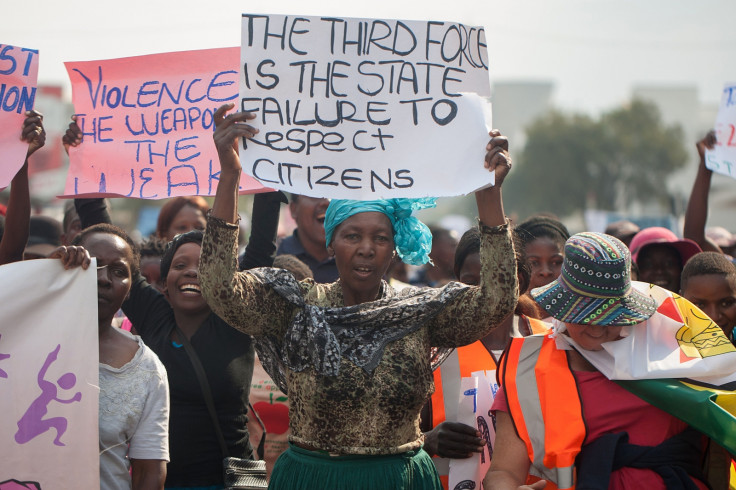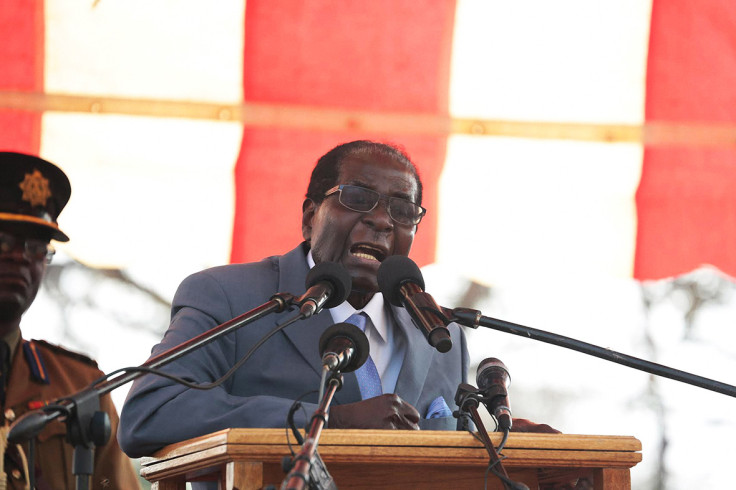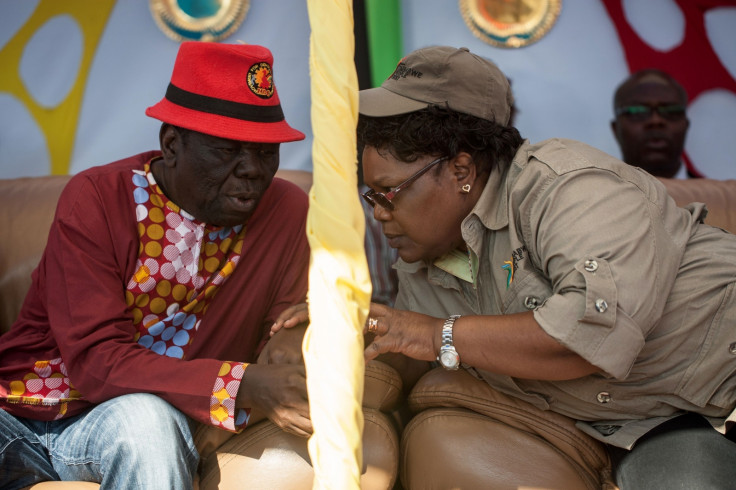Opposition 'ready to take over' from ageing Mugabe as protests turns violent in Harare
IBTimes UK speaks to expert Charles Laurie about the battle to succeed 92-year-old president.

As protest against Zimbabwe's leadership generated into violence on Wednesday 24 August, analysts have warned that "something sudden can happen in the country". The warning comes as it emerged that the security forces responded with a heavy hand to a protest organised by the main opposition party, the Movement for Democratic Change (MDC) in the capital Harare.
Many protesters were reported to have been injured after riot police used tear gas, water cannons and batons to disperse the crowd that called on President Robert Mugabe, 92, to step down, accusing him of running a dictatorship.
The same day, Zimbabwe's cash-strapped government, which has been unable to pay its 300,000 civil servants on time so far this year, announced it would be axing some 8,250 state workers from its agriculture ministry – 43% of the workforce. The Public Service Commission, which oversees government departments, also revealed the state had ordered a freeze on hiring and promotions across all government departments.
Building pressure for 'something sudden to happen'
"The core drivers of unrest are building up in pressure at a level that we haven't seen in quite some time. This, coupled with the weakening of the economy and the sheer fact that Mugabe is ageing, means that there is a lot of pressure for something sudden to happen in the country," Charles Laurie, head of country risk at Verisk Maplecroft, which provides country and political risk analysis, told IBTimes UK.
The discontent is a milestone in its longevity and the persistence of social media movements – particularly #ThisFlag and #Tajamuka campaigns.
"You have a sense in the general population of weakness in the ruling party and the state security apparatus – which has been manifested through social media-driven protests. The apparatus has shown it is unable – expect through the most clumsy means to counter social media – it's difficult to see how effective the new bill would be as social media is so prolific."
The leading expert on the history of Zimbabwe and Southern Africa, however, acknowledged it is still too early to say whether there may be "an outright seizure of power". "If one looks at Zimbabwe historically, there is no precedent to this, and any leader who did actually make a grab for power would be facing a lot of genuine dissatisfaction from all sides. It's not in the DNA of Zimbabweans to make this kind of move. Nonetheless, you have a weakening leadership and the political, economic and social pressure is mounting. Where we could enter an uncertain period is if Mugabe was incapacitated."
The leader's age is certainly raising the question of when the end of the President Mugabe era will arrive, and what the plan will be in that event, the analyst said.
Highlighting a disunited opposition in Zimbabwe – despite five opposition parties forming a coalition to challenge Mugabe earlier this year – Laurie warned that, were the post-Mugabe era to arrive unexpectedly, the ruling Zanu-PF party is still the strongest party.

'Jostling' in a deeply divided Zanu-PF
While there is no clear succession plan in the event that Mugabe was to expire, a number of key individuals are jostling to align themselves individually to be in the best possible position to take over the leadership. Indeed, Laurie said, it is worth noting how divided Mugabe's ruling Zanu-PF party really is. The war veterans recent split from Mugabe as an individual leader to some extent and from Zanu-PF "is an extremely serious milestone".
"The war veterans are in fact the heart and soul of Zanu-PF and have in the past really functioned as militia to ensure Zanu-PF continuity in electoral challenges. So to have the veterans split away with a very public statement – even if there were a number of factions involved – of rebuke against Mugabe means that there are enormous divisions in the ruling party."
General Constantine Chiwenga, the commander of Zimbabwe Defence forces (ZDF) earlier this month insisted the army "stand(s) firm and unequivocally" behind Mugabe, but Laurie highlighted the drift may be already widening. "When one says that the army is in support of Mugabe, one must remember that the army is full of war veterans – and war veterans occupy many senior positions in the state civil service. If you have a split in loyalty with war veterans – even though it doesn't include all veterans, it means that the very functioning of government and certainly the allegiance of the military is very much in question."
Divided opposition eyeing the top seat
Would Mugabe enter into a period of prolonged incapacitation, any number of manoeuvres from what would almost certainly be Zanu-PF members – particularly vice-president Emmerson Mnangagwa and Mugabe's wife Grace Mugabe, are to be expected.
Laurie believes that both party heavyweights would try to subtly wrestle leadership and assume control. "Mnangagwa certainly has the longevity, depth and has more popularity than Grace. He is undoubtedly the stronger of the two in the event of a leadership challenge. Grace would have you believe that she is broadly popular but she is not a popular political leader, she exists through the reflected glory of her husband and in the event of Mugabe's demise, support for Grace would rapidly diminish."
From this arises an opportunity for the opposition to unite under strong leadership to confront the Zanu-PF power, Laurie added, with the most likely contender being former vice-president Joice Mujuru and her Zimbabwe People First (Zim-PF) party. "Her sacking was a grave error from Zanu-PF because it created justification and sympathy for what is now the strongest opposition leader".
In a field of disunity, Mujuru is someone that brings political experience, the ability to somewhat unite former Zanu-PF members and opposition elements and brings the intimate knowledge of the inner workings of the ruling party and can therefore understand the ruling party's playbook, and more theoretically counter steps that Zanu-PF will take to defeat her, the analyst added.

© Copyright IBTimes 2025. All rights reserved.






















